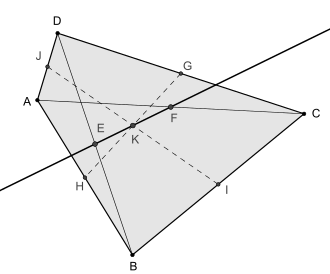Talk:Newton line
| This article is rated Start-class on Wikipedia's content assessment scale. It is of interest to the following WikiProjects: | |||||||||||
| |||||||||||
Newton versus Newton-Gauss/Gauss
[edit]Personally I've seen the term Gauss or Newton-Gauss usually in connection with a complete quadrilateral which of course is closely related but not quite the same. It might be better to split those in 2 different articles (one for the Newton/Gauss line and complete quadrilateral and one for the "plain" Newton line). This allows also to separate more advanced material from more elementary and hence improving accessibility.--Kmhkmh (talk) 23:30, 1 March 2014 (UTC)
- P.S. For the complete quadrilateral and its Newton-Gauss line there is also a separate graphic available.

- You are right about the distinction, so I removed my additions. There already is an article on the complete quadrangle, you can add your figure there. Circlesareround (talk) 19:02, 2 March 2014 (UTC)
- I'm considering to set up separate article for complete quadrilateral and the Netwon-Gauss line, which would contain your information and we can link it in this article then. This might introduce a bit additional redundancy, but I like this separation in different bits/articles partially requiring less context knowledge, as this makes a part of the information more accessible than having everything in one article being heavy on the more general theory.--Kmhkmh (talk) 20:03, 2 March 2014 (UTC)
- You are right about the distinction, so I removed my additions. There already is an article on the complete quadrangle, you can add your figure there. Circlesareround (talk) 19:02, 2 March 2014 (UTC)
Is there a source that calls the line as defined (connection of the midpoints of the diagonals)?
- Yes there is: [1] Circlesareround (talk) 22:20, 17 October 2016 (UTC)
Does K bisect EF?
[edit]From the article section "Properties":

- The line segments connecting the midpoints of opposite sides (the bimedians) of a convex quadrilateral intersect in a point [K in the graph] that lies on the Newton line.
In the graph it looks like K bisects EF (the connecting segment of the diagonals' midpoints), but the article doesn't mention it. Is this true for all (non-parallelogram) quadrilaterals? Loraof (talk) 16:28, 7 November 2016 (UTC)
- Do you have a citation for that, so I can put the property into the article? Loraof (talk) 19:24, 7 November 2016 (UTC)
- I have already included it with reference :) Circlesareround (talk) 19:37, 7 November 2016 (UTC)
Why not merge with Newton-Gauss line?
[edit]They are the same geometric object, just the Newton Gauss line is for a complete quadrangle. 2600:4040:2CA4:8700:8C88:9E47:9EA0:39AD (talk) 03:23, 26 December 2024 (UTC)

